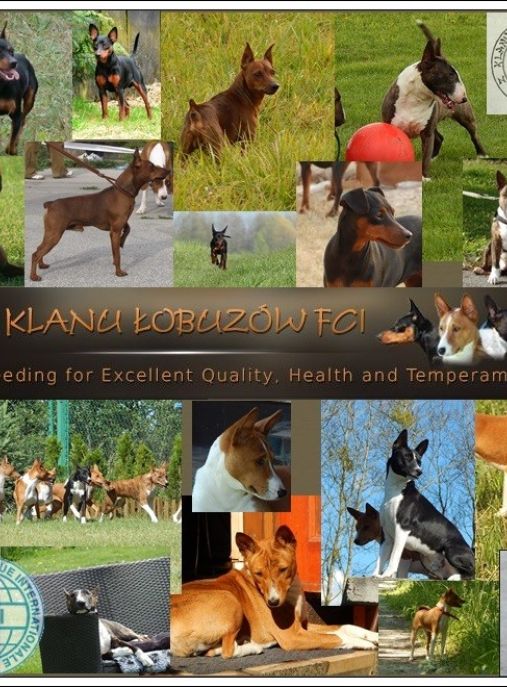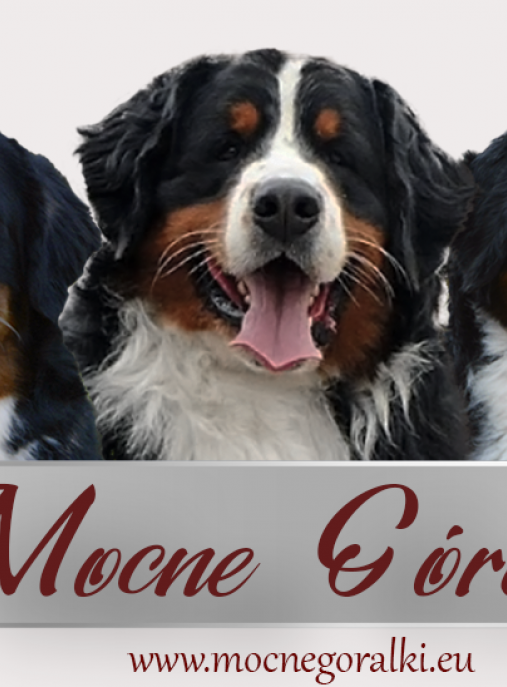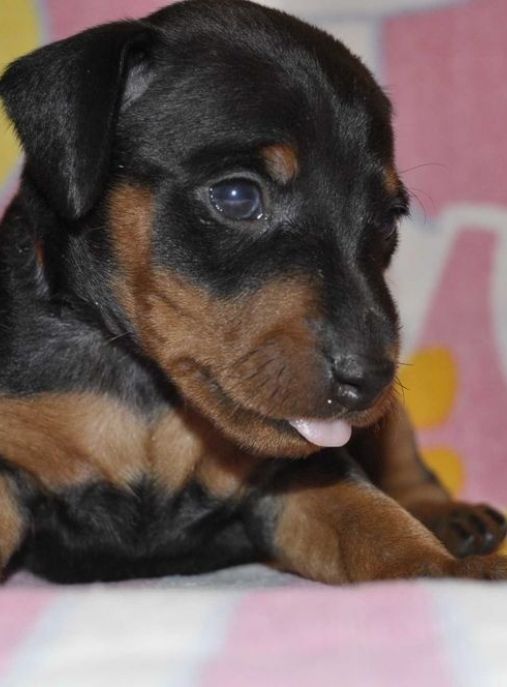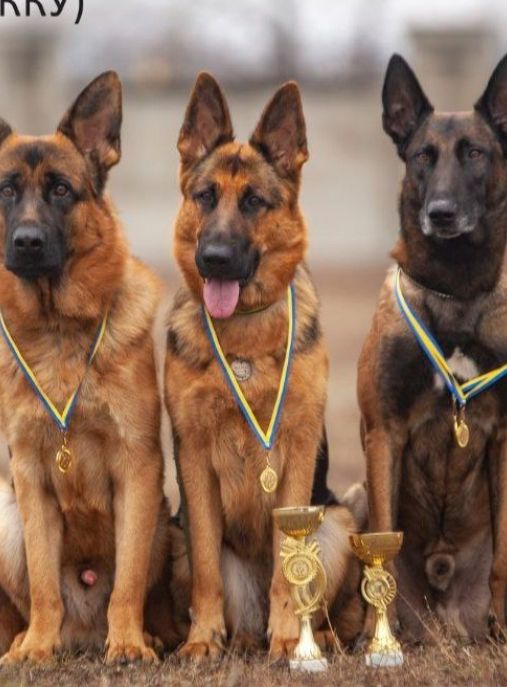The Miniature Pinscher, also known as the Min Pin, is a small and energetic dog breed that is known for its spirited personality and distinctive appearance. Despite its name, the Miniature Pinscher is not a miniature version of the Doberman Pinscher, but rather a breed with its own unique characteristics. With their sleek and compact bodies, alert expression, and high energy levels, these dogs make for lively and entertaining companions.
The history of the Miniature Pinscher can be traced back to Germany, where it was developed in the 19th century. It is believed that the breed was created by crossing small German Pinschers with Italian Greyhounds and Dachshunds, resulting in a dog with a unique combination of traits. Originally, Miniature Pinschers were bred for hunting small game, such as rats and mice, and their agility and speed made them excellent at this task.
According to the FCI (Fédération Cynologique Internationale) typology, the Miniature Pinscher belongs to Group 2 - Pinscher and Schnauzer type dogs. Within this group, it falls under Section 1 - Pinscher, and is classified as a Pinscher type dog. This classification is based on the breed's physical characteristics, temperament, and historical purpose.
Miniature Pinschers are known for their lively and fearless nature, making them suitable for active individuals or families who can provide them with plenty of exercise and mental stimulation. They are highly intelligent and require regular mental challenges to prevent boredom and destructive behavior. Due to their small size, they are well-suited for apartment living, but they still need daily walks and playtime to burn off their energy.
In terms of size, Miniature Pinschers are small dogs, typically weighing between 8 to 12 pounds (3.6 to 5.4 kilograms). They stand at a height of around 10 to 12.5 inches (25 to 32 centimeters) at the shoulder. Despite their small stature, they possess a muscular and compact build, with a well-defined chest and a sleek, short coat that comes in various colors, including black and tan, red, and chocolate.
The average lifespan of a Miniature Pinscher is around 12 to 15 years, although with proper care and nutrition, some individuals have been known to live even longer. Like many small dog breeds, they can be prone to certain health issues, including patellar luxation (knee joint problems), Legg-Calve-Perthes disease (hip joint disorder), and progressive retinal atrophy (a degenerative eye disease). Regular veterinary check-ups and a balanced diet can help mitigate these risks.
One interesting fact about Miniature Pinschers is their resemblance to the larger Doberman Pinscher. This resemblance is not coincidental, as the Miniature Pinscher is believed to have influenced the development of the Doberman Pinscher breed. The Miniature Pinscher's sleek and elegant appearance, along with its fearless and alert temperament, were desired traits that were selectively bred into the Doberman Pinscher.
Another interesting characteristic of the Miniature Pinscher is its strong prey drive. These dogs have a natural instinct to chase and hunt small animals, which can make them unsuitable for households with small pets such as rabbits or rodents. Early socialization and training can help minimize this instinct, but it is important to always supervise interactions between a Miniature Pinscher and smaller animals.
In conclusion, the Miniature Pinscher is a small and spirited breed that brings a lot of energy and personality to any household. With their compact size, intelligence, and lively nature, they make for entertaining and loyal companions. However, potential owners should be prepared to provide them with plenty of exercise, mental stimulation, and socialization to ensure a happy and well-rounded dog.
The Miniature Pinscher, also known as the Min Pin, is a small yet mighty breed that possesses a unique character and charm. Despite their small size, these dogs are full of energy, intelligence, and confidence. In this text, we will delve into the character of Miniature Pinschers, their behavior, and how to raise and train them effectively.
One of the most prominent traits of Miniature Pinschers is their fearless and independent nature. They are known for their self-assured demeanor, often displaying a larger-than-life attitude. This breed is highly alert and observant, always on the lookout for any potential threats or intruders. Their protective instincts make them excellent watchdogs, as they will not hesitate to sound the alarm when they sense something amiss.
Miniature Pinschers are also incredibly energetic and lively. They have a seemingly endless reserve of energy, which they love to channel into playtime and exercise. These dogs thrive on physical activities and mental stimulation, making them a great choice for active individuals or families. Regular exercise is crucial for their well-being, as it helps prevent boredom and destructive behaviors that may arise from pent-up energy.
Despite their independent nature, Miniature Pinschers are also known for their affectionate and loving personalities. They form strong bonds with their owners and enjoy being part of the family. They often seek attention and love to be involved in their human's activities. However, they can be wary of strangers and may require proper socialization from an early age to ensure they are comfortable around new people and situations.
When it comes to training, Miniature Pinschers are intelligent and quick learners. They possess a natural curiosity and eagerness to please, which can be harnessed to teach them various commands and tricks. However, their independent streak may sometimes make them stubborn or headstrong. Consistency, positive reinforcement, and patience are key when training a Miniature Pinscher. Harsh or forceful methods should be avoided, as they can lead to a negative response or resistance.
Early socialization is crucial for Miniature Pinschers to develop into well-rounded dogs. Exposing them to different environments, people, and animals from a young age will help them become more confident and adaptable. It is essential to introduce them to various stimuli gradually, ensuring positive experiences to prevent fear or aggression issues later in life.
Due to their small size, Miniature Pinschers are well-suited for apartment living. However, they still require regular exercise and mental stimulation to prevent boredom and restlessness. Daily walks, play sessions, and interactive toys can help keep them physically and mentally engaged.
In conclusion, Miniature Pinschers are spirited, intelligent, and affectionate dogs. Their fearless nature, combined with their energetic personality, makes them a delightful companion for active individuals or families. With proper training, socialization, and exercise, Miniature Pinschers can thrive and bring joy to their owners' lives.
The Miniature Pinscher, also known as the Min Pin, is a small and energetic breed that requires specific care to ensure their well-being. Here are some tips on how to care for Miniature Pinscher dogs, including what to do and what not to do:
1. Exercise: Miniature Pinschers are active dogs that require regular exercise to burn off their energy. Daily walks, playtime, and interactive toys are essential to keep them mentally and physically stimulated. However, avoid overexertion, especially in extreme weather conditions, as they are prone to overheating.
2. Grooming: Min Pins have a short, smooth coat that requires minimal grooming. Regular brushing with a soft bristle brush helps to remove loose hair and keep their coat healthy. Bathing should be done only when necessary, using a mild dog shampoo. Pay attention to their nails, as they tend to grow quickly, and trim them regularly to prevent discomfort.
3. Feeding: Provide a balanced and nutritious diet suitable for small breeds. High-quality dog food, either commercial or homemade, should be fed in appropriate portions to maintain a healthy weight. Avoid overfeeding, as Miniature Pinschers are prone to obesity, which can lead to various health issues.
4. Training and Socialization: Miniature Pinschers are intelligent and eager to please, making them relatively easy to train. Start training early and use positive reinforcement techniques such as treats and praise. Socialization is crucial to prevent them from becoming overly protective or aggressive. Expose them to various people, animals, and environments from a young age.
5. Health Care: Regular veterinary check-ups are essential to monitor the overall health of your Min Pin. Vaccinations, parasite prevention, and dental care should be maintained as per your veterinarian's recommendations. Miniature Pinschers are prone to certain health conditions such as patellar luxation, Legg-Calve-Perthes disease, and progressive retinal atrophy, so be vigilant and watch for any signs of discomfort or illness.
6. Safety: Min Pins are curious and fearless dogs, so it's crucial to ensure their safety. Secure your home and yard with proper fencing to prevent them from escaping. Keep harmful substances, small objects, and toxic plants out of their reach. Additionally, supervise them around larger dogs or children to avoid any potential accidents.
7. Mental Stimulation: Miniature Pinschers are intelligent dogs that require mental stimulation to prevent boredom and destructive behavior. Provide them with puzzle toys, interactive games, and training sessions to keep their minds engaged. Mental stimulation can help prevent behavioral issues such as excessive barking or chewing.
What not to do:
1. Do not leave your Miniature Pinscher alone for extended periods. They thrive on human companionship and can develop separation anxiety if left alone for too long.
2. Avoid harsh training methods or punishment-based techniques. Min Pins respond best to positive reinforcement and gentle guidance.
3. Do not overfeed your Min Pin or provide them with table scraps. Stick to a balanced diet to prevent obesity and related health issues.
4. Avoid excessive exercise in extreme weather conditions, as Miniature Pinschers are sensitive to heat and cold.
5. Do not neglect their dental care. Regular teeth brushing and dental check-ups are essential to prevent dental diseases.
Remember, every dog is unique, and individual care requirements may vary. It's important to consult with your veterinarian for personalized advice on caring for your Miniature Pinscher.
The common color of Miniature Pinscher dogs is a rich, lustrous shade known as "red." This vibrant hue is the hallmark of the breed and is often described as a deep, mahogany red or a rusty brown. The color is uniform throughout the dog's body, with no variations or markings.
The red coat of the Miniature Pinscher is glossy and sleek, giving the dog a polished and elegant appearance. It is a short-haired breed, and the smooth texture of the coat enhances the intensity of the red color. The coat lies close to the body, accentuating the dog's well-defined muscles and athletic build.
When the light hits the Miniature Pinscher's red coat, it creates a stunning play of shades and highlights. The deep red color can appear even more vibrant and radiant, making the dog truly stand out. This striking coloration is one of the reasons why Miniature Pinschers are often admired and sought after.
The red color of the Miniature Pinscher's coat is not only visually appealing but also serves a practical purpose. It provides excellent camouflage in various environments, allowing the dog to blend in with its surroundings. This was particularly advantageous in the breed's early days when they were used as ratters and hunters. The red coat helped them remain inconspicuous while stalking their prey.
It is important to note that while red is the most common color for Miniature Pinschers, there are other acceptable coat colors within the breed standard. These include solid black and chocolate, both of which are less prevalent but equally stunning. However, the red color remains the most iconic and widely recognized.
In addition to the coat color, Miniature Pinschers often have distinct tan markings on their face, chest, legs, and eyebrows. These tan points provide a beautiful contrast against the red background, further enhancing the dog's overall appearance. The tan markings are typically a lighter shade, ranging from a warm tan to a creamy beige.
Overall, the red color of Miniature Pinscher dogs is a defining characteristic that sets them apart from other breeds. It exudes elegance, strength, and vitality, perfectly complementing the breed's spirited and lively personality. Whether in motion or at rest, the red coat of a Miniature Pinscher is a sight to behold, captivating all who encounter these remarkable dogs.
The Miniature Pinscher, also known as the Min Pin, is a small and energetic breed that requires proper care and attention to maintain good health. These dogs are generally healthy, but like any other breed, they are prone to certain health conditions. Understanding the common diseases and taking appropriate measures can help ensure the well-being of your Miniature Pinscher.
One of the most prevalent health issues in Miniature Pinschers is patellar luxation. This condition occurs when the kneecap slips out of its normal position, causing discomfort and lameness. Regular exercise and maintaining a healthy weight can help prevent this condition. If your Min Pin shows signs of limping or difficulty walking, consult a veterinarian for a proper diagnosis and treatment options.
Another common health concern in Miniature Pinschers is dental disease. Due to their small size, their teeth are often crowded, making them more susceptible to plaque and tartar buildup. Regular dental care, including brushing their teeth and providing dental chews or toys, is essential to prevent periodontal disease. Routine dental cleanings by a veterinarian may also be necessary to maintain good oral health.
Hypothyroidism is another condition that affects Miniature Pinschers. It occurs when the thyroid gland does not produce enough hormones, leading to a variety of symptoms such as weight gain, lethargy, and skin problems. Regular blood tests can help detect this condition early, and medication can be prescribed to manage it effectively.
Like many small breeds, Miniature Pinschers are prone to obesity. Obesity can lead to various health issues, including joint problems, diabetes, and heart disease. It is crucial to provide a balanced diet and monitor their calorie intake. Regular exercise, such as daily walks and playtime, is essential to keep them fit and maintain a healthy weight.
Additionally, Miniature Pinschers may be predisposed to certain genetic conditions such as Legg-Calve-Perthes disease, a hip joint disorder, and progressive retinal atrophy, a degenerative eye disease. Regular veterinary check-ups, including thorough physical examinations and screenings for genetic conditions, can help identify these issues early on.
To care for the health of your Miniature Pinscher, ensure they receive regular vaccinations and preventive treatments for parasites such as fleas, ticks, and heartworms. Regular grooming, including brushing their short coat and cleaning their ears, is necessary to maintain their overall hygiene.
Proper nutrition is vital for their well-being. Feed them a high-quality, balanced diet formulated for small breeds, and avoid overfeeding. Provide fresh water at all times and avoid giving them table scraps or unhealthy treats.
Lastly, mental stimulation is crucial for Miniature Pinschers. They are intelligent and active dogs that require mental and physical exercise to prevent boredom and destructive behavior. Engage them in interactive play, obedience training, and provide them with puzzle toys to keep their minds sharp and active.
In conclusion, Miniature Pinschers are generally healthy dogs, but they can be prone to certain health conditions. Regular veterinary care, a balanced diet, exercise, and proper dental care are essential for their overall health and well-being. By being proactive and attentive to their needs, you can ensure your Miniature Pinscher leads a happy and healthy life.
The Miniature Pinscher, also known as the Min Pin, is a small and energetic breed that requires a well-balanced and nutritious diet to maintain optimal health. Proper nutrition plays a vital role in their overall well-being, including their energy levels, coat condition, and longevity. In this text, we will provide advice on how and what to feed Miniature Pinschers, as well as highlight some foods to avoid.
When it comes to feeding Miniature Pinschers, it is important to choose high-quality dog food that meets their specific nutritional needs. Look for a dog food that is specifically formulated for small breeds or toy breeds, as these will have the appropriate nutrient levels and kibble size for their small mouths. Additionally, opt for a dog food that lists a high-quality source of animal protein as the first ingredient, such as chicken, beef, or fish.
It is recommended to feed Miniature Pinschers two small meals per day rather than leaving food out all day for grazing. This helps to regulate their metabolism and prevents overeating, which can lead to weight gain. Portion control is crucial, as Miniature Pinschers are prone to obesity. Consult with your veterinarian to determine the appropriate portion size based on your dog's age, weight, and activity level.
In addition to commercial dog food, it is beneficial to incorporate fresh, whole foods into their diet. Lean meats like chicken or turkey, cooked eggs, and fish can be added as protein sources. Vegetables such as carrots, green beans, and sweet potatoes can provide essential vitamins and fiber. Fruits like apples, blueberries, and bananas can be given as occasional treats, but avoid grapes and raisins as they can be toxic to dogs.
While some human foods can be safe for dogs, there are certain foods that should be avoided entirely. These include chocolate, caffeine, alcohol, onions, garlic, avocados, and foods containing xylitol, as they can be toxic to dogs and cause serious health issues. Additionally, avoid feeding your Miniature Pinscher bones, as they can splinter and cause choking or internal injuries.
Proper hydration is also crucial for Miniature Pinschers. Always provide fresh and clean water for your dog, and ensure they have access to it throughout the day. Avoid giving them excessive amounts of water immediately before or after meals, as it can interfere with digestion.
Regular exercise is essential for Miniature Pinschers to maintain a healthy weight and overall fitness. Along with a balanced diet, daily walks, playtime, and mental stimulation are important to keep them physically and mentally stimulated.
Lastly, it is important to monitor your Miniature Pinscher's weight and body condition regularly. If you notice any sudden weight loss or gain, consult with your veterinarian to rule out any underlying health issues or adjust their diet accordingly.
In conclusion, feeding a Miniature Pinscher a well-balanced diet that includes high-quality dog food, fresh whole foods, and proper portion control is essential for their overall health and longevity. Avoiding toxic foods and providing regular exercise will help ensure they lead a happy and healthy life. Always consult with your veterinarian for personalized advice and recommendations based on your dog's specific needs.

























